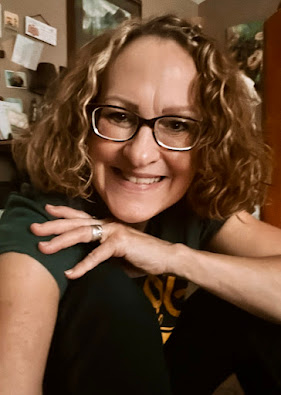"Ace Boggess is author of six books of poetry, most recently Escape Envy. His writing has appeared in Indiana Review, Michigan Quarterly Review, Notre Dame Review, Hanging Loose, and other journals. An ex-con, he lives in Charleston, West Virginia, where he writes and tries to stay out of trouble."
Freudian Slip
Sometimes while telling a story about my early days
in prison, without thinking, I say during my first semester—
a Freudian slip like in the joke about the airport guy
requesting two pickets to Tittsburgh &,
like in the joke, it’s kind of funny & kind of sad.
That was where I began my second education.
My new university an aquarium full of piranhas,
I was the clumsy, curious cat who fell in,
somehow made it out with a few wounds
that turned to scars I lick & lick & can’t erase.
I learned a lot during my first semester:
how pungent scents of watermelon hooch &
pepper spray will cause a man to weep
into the collar of his undershirt;
how one must turn his head from the fist
that hunts his face; not to mention
how noises of voices, slamming cards, &
radio static won’t go away.
To sleep, one finds silence within,
a place of peace in a warzone—
Places of Peace in Warzones the title of a course
during my first semester, which I say &
shake my head at the joke so like the other joke
that ends with the line You’ve ruined my life.
Anthology
So curious to see these poets’ early work
so old & out of touch I don’t connect with it.
So, Ashbery already wrote his inside jokes
he alone was on the inside of.
So, there’s James Tate writing normal lines
with none of the fantasia of his later mind.
So much so-so that must have been magnificent
when rhymes, angels, & ancient Greeks called to us.
So: Rich, Meredith, Merwin, Valentine—
a lot to take in, marveling at how they grew
so far beyond these early perceived greatnesses,
enchanted then by their sex lives &
so enthralled with love, loving, beloveds.
I’m glad I’m taking this journey with them
so I can say I’ve travelled in a time machine, &
oh the things I’ve seen & soon forgotten.
Impostor Syndrome
Do marathon winners doubt themselves,
believe if they were better
they would’ve crossed the line a minute faster,
see failure in success, their trophies
too small, their payouts token?
What about farmers? Why are their rows so crooked?
As the sun rises above their plots
like a laughing emoji, surely they dread
how small & inferior their ears of corn must be,
how green & hard their tomatoes.
Writers & artists can’t be the only ones
who look at their work & say, I’ve never
created anything beautiful,
challenging, magnificent, or worthwhile.
Consider the divorce lawyer
whose briefs present too much sentiment,
the trucker hauling ass a bit too slowly
through the mountains
as if driving a tractor-trailer made of stone.
What of the surgeon cutting into a patient’s brain?
Do we want her disbelieving,
doubting skills she acquired over years?
Here we are with our pens & paints,
unable to excise tumors or harvest a sizeable yield.
The sun above our heads keeps laughing, &
we want to lose control of our wheels
doing sixty on I-68 at a six-percent grade.




%20(1).jpeg)

.jpg)